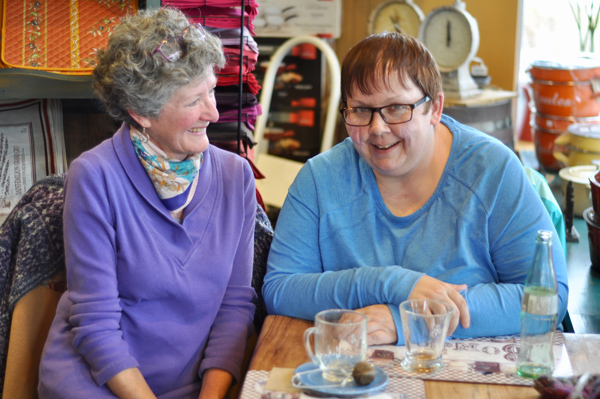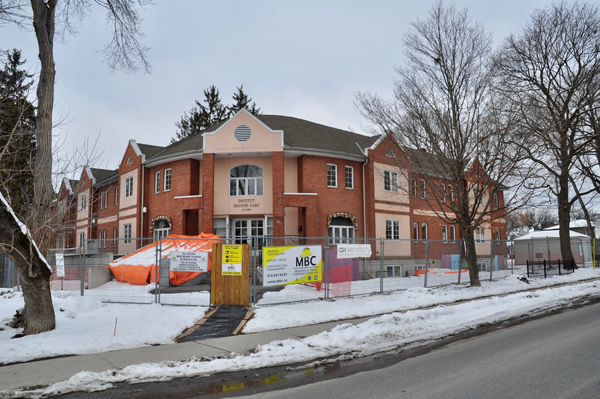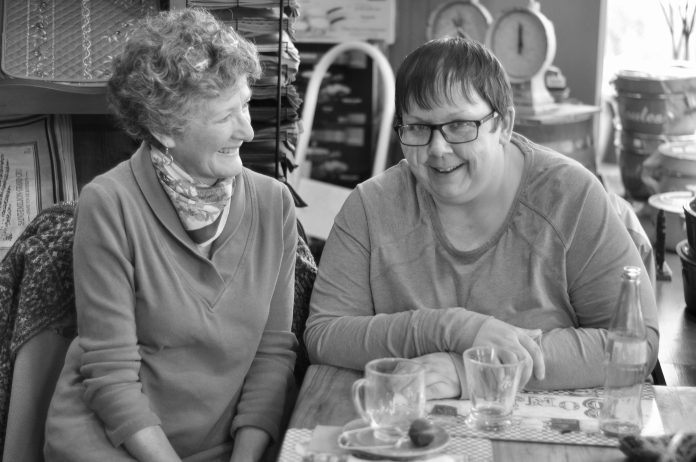By Andrea Prazmowski –
In a cozy corner of a Richmond Road coffee shop, Sheena and Mary are chatting and telling their stories. Like old friends do, one of them sometimes fills in details of a story the other has forgotten. They smile often and nod their agreement and laugh at the mention of a recent shopping trip. “For new underwear!” Sheena reveals with a grin and a ripple of laughter.
Yup. They’re that kind of friends.
The kind you can go underwear shopping with.
The kind who go to aquafit with you when you’re recovering from a knee replacement.
The kind who keep you alive.

“Your loneliness is going to kill you. We have to find a community of women who will embrace you.” That doctor’s pronouncement, during one of Sheena’s frequent hospital stays more than seven years ago, stands out clearly in her memory.
She’d been in and out of hospital for years, struggling with mental health issues after a childhood of terrible abuse. Sheena fled home at a very young age and then lived in a succession of group homes, detention centres, shelters and temporary housing for 29 years.
“I lived everywhere and I never really belonged anywhere,” she says.
Sheena found her community at Cornerstone Housing for Women. In 2011, not long after that doctor’s prognosis, she moved into Cornerstone’s residence on Booth Street, along with 41 other women with histories of homelessness, poverty, and abuse. With her own bachelor unit, a meal plan and numerous support services, the home has offered Sheena stability and a place to heal.
Early on, Sheena was matched with Mary McNamara. They knew each other from Sheena’s stays at The Ottawa Hospital, where Mary was an Occupational Therapist. Newly retired, Mary was teaching sewing classes at Booth Street and they re-connected. They’ve been getting together for six years, at least once a week and sometimes more often. Mary, who lives in the Civic Hospital neighbourhood, often accompanies Sheena to medical appointments. After Sheena’s knee replacement, they went to aquafit together.
“Mary was with me the whole way. She’s like a big sister to me,” she says.
Sheena has similar praise for Cornerstone staff and other volunteers and residents. The two chefs in the kitchen are “the most amazing men you’ve ever met.”
Despite conflicts and challenges, the residents stand up for each other. “The women here don’t judge me,” she explains. “They accept me as I am.”
“I cherish all of that. I have never felt so loved.”
Cornerstone will widen that loving community when they open a new residence this fall in the former home of the Sisters of Jeanne D’Arc on Princeton Avenue. It will provide supportive housing to 42 women who’ve moved beyond the crisis stage and are ready for more independence. There will be a Lifelong Learning Centre for residents to upgrade their education and learn new skills. Ten per cent of the units will be for Indigenous women and an Indigenous elder will be on staff two days a week.

Government funding is covering much of the $6.8 million cost. Cornerstone hopes they can raise $1.9 million with the community’s help.
Executive Director Sue Garvey and Foundation Chair Wilda Phillips are effusive in their gratitude for the support the project has received in the neighbourhood. “It’s been embraced with such warmth and enthusiasm, from the business community, from neighbours and churches and schools,” says Wilda.
Ultimately, it’s not about a building, but about the connections made possible because of the building, says Mary. “It’s the relationships that really give women the confidence to move forward.”
When they arrive at Cornerstone, they may be unsure they can trust the people, she says. “But when they recognize there’s safety there…” she begins.
“…it changes,” Sheena says, finishing her sentence.
A lot has changed for Sheena. She’s been shaving her head since she was 15. It was a way to create a “barrier,” she explains; a way to tell people to “back off.” Last year she decided to let her hair grow and by December it was long enough for a haircut.
“Back off” is no longer Sheena’s message to the world. She helps in the kitchen. She writes for the Cornerstone newsletter. Her hospital stays are far fewer.
“I still have my problems, but I know I’m getting better. I’m blessed to have people in my life that care about me,” says Sheena. “If this hadn’t happened, I’d be gone.”
Learn more and donate to the Princeton Avenue campaign online at cornerstonewomen.ca.
